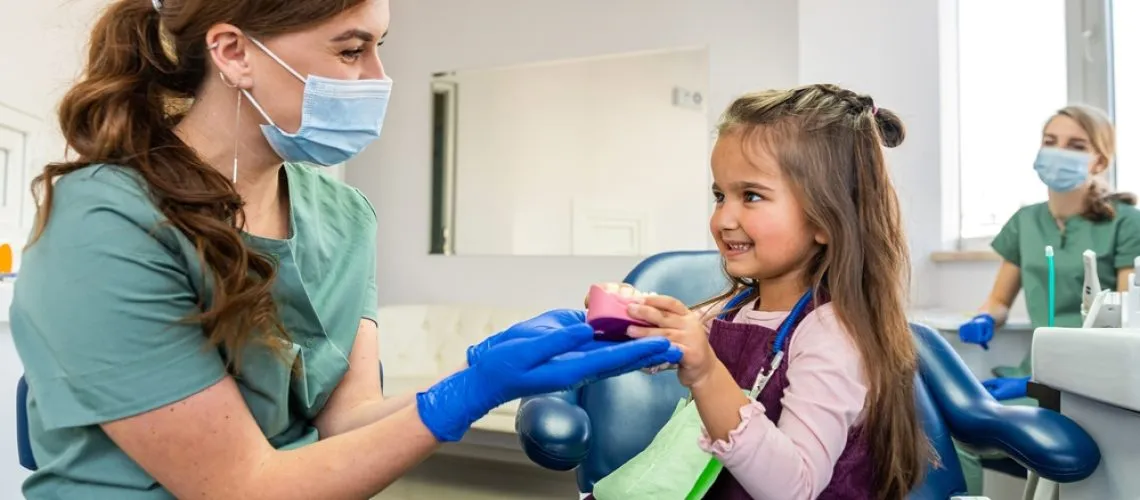As parents, ensuring your child gets enough sleep is crucial for their overall well-being. However, sleep habits can also significantly impact your child’s dental health. At Kids World Pediatric in San Antonio, Texas, Dr. Marielena Torres-Ricart emphasizes the importance of incorporating teeth-friendly practices into your child’s bedtime routine. These habits promote better sleep and help protect their teeth from decay and other oral health issues.
The Connection Between Sleep and Oral Health
Many parents may not realize the strong connection between sleep and oral health. During sleep, the body undergoes various essential processes for growth, healing, and overall health. The mouth, too, is affected by sleep patterns. For instance, saliva production decreases during sleep, leading to a dry mouth—a condition that increases the risk of tooth decay and gum disease.
Moreover, certain sleep behaviors, such as grinding teeth (bruxism) or mouth breathing, can negatively impact oral health. Addressing these behaviors early can prevent long-term dental issues and contribute to a healthier mouth.
Establishing a Teeth-Friendly Bedtime Routine
Creating a consistent and teeth-friendly bedtime routine is one of the most effective ways to protect your child’s dental health. Here are some key practices to incorporate:
1. Brush Before Bed
Brushing your child’s teeth before bed is non-negotiable. This simple habit helps remove food particles and plaque that can cause cavities. Use fluoride toothpaste and ensure your child brushes for at least two minutes. For younger children, parents should assist with brushing to ensure that all surfaces of the teeth are properly cleaned.
2. Avoid Sugary Snacks and Drinks
It’s important to avoid giving your child sugary snacks or drinks close to bedtime. Sugar is a primary contributor to tooth decay, and consuming it before bed can be harmful. After eating or drinking sugary items, the mouth’s pH level drops, creating an acidic environment that can erode tooth enamel. The risk of cavities increases without adequate saliva production during sleep to neutralize this acid.
Instead of sugary snacks, choose teeth-friendly alternatives like cheese, nuts, or plain yogurt. Water is the best option if your child needs a drink before bed.
3. Encourage Mouth-Closed Breathing
Mouth breathing during sleep can dry out the mouth, reducing saliva flow and creating an environment where bacteria thrive. This can lead to an increased risk of tooth decay and gum disease. Encourage your child to breathe through their nose rather than their mouth while sleeping.
If mouth breathing is a persistent issue, it may be due to allergies, enlarged tonsils, or other underlying health concerns. Consult with Dr. Marielena Torres-Ricart to explore possible solutions and ensure your child’s oral health isn’t compromised.
Managing Stress and Relaxation for Better Oral Health
Stress and anxiety can manifest in various ways, including behaviors that negatively affect oral health. Teeth grinding (bruxism) is a common response to stress in children, leading to tooth wear, jaw pain, and other dental issues.
1. Create a Relaxing Bedtime Environment
A calm and relaxing bedtime environment can help reduce stress and anxiety in children, leading to better sleep and a lower likelihood of teeth grinding. Consider incorporating soothing activities like reading a book, listening to calming music, or practicing deep breathing exercises before bed.
2. Monitor and Address Teeth Grinding
If your child grinds their teeth at night, it’s important to address this behavior early. Teeth grinding can cause significant damage to the teeth over time, including enamel wear, tooth sensitivity, and even fractures. Dr. Marielena Torres-Ricart may recommend a custom mouthguard to protect your child’s teeth while they sleep.
Additionally, identifying and managing the underlying causes of stress can help reduce the occurrence of teeth grinding. Encourage open communication with your child to understand any concerns or anxieties they may be experiencing.
The Importance of Regular Dental Check-Ups
While establishing healthy sleep and relaxation habits is essential, regular dental check-ups are equally important for maintaining your child’s oral health. At Kids World Pediatric in San Antonio, Texas, Dr. Marielena Torres-Ricart provides comprehensive dental care tailored to children’s unique needs.
During routine check-ups, Dr. Torres-Ricart can identify early signs of dental issues, such as cavities, gum disease, or the effects of teeth grinding. Early detection allows for timely intervention, preventing more serious problems.
Regular dental visits also allow parents and children to receive personalized advice on maintaining healthy habits at home. Dr. Torres-Ricart can offer guidance on everything from proper brushing techniques to managing stress-related behaviors that affect oral health.
Encouraging Lifelong Healthy Habits
Establishing teeth-friendly habits during childhood sets the foundation for a lifetime of good oral health. By prioritizing your child’s dental care as part of their overall well-being, you help them develop healthy routines that will serve them well into adulthood.
Remember that children learn by example, so modeling good oral hygiene and relaxation practices yourself can reinforce these habits in your child. Celebrate small successes, like brushing consistently or avoiding sugary snacks, to keep your child motivated and engaged in their oral health journey.
Building a Healthier Future for Your Child’s Smile
Incorporating teeth-friendly habits into your child’s sleep and relaxation routines is a powerful way to protect their oral health and promote better sleep quality. By focusing on consistent oral hygiene, stress management, and regular dental visits, you can help your child build a foundation for a healthy and bright smile.
At Kids World Pediatric in San Antonio, Texas, Dr. Marielena Torres-Ricart is dedicated to supporting parents and children in their journey toward optimal oral health. By working together, we can ensure that your child enjoys a lifetime of healthy, happy smiles.
Sources:
- American Academy of Pediatric Dentistry. (2020). Policy on the Use of Xylitol in Caries Prevention. Pediatric Dentistry.
- National Sleep Foundation. (2017). How Sleep Affects Your Teeth. Sleep Health Journal.
- Wells, E. M., & Barile, J. P. (2016). Bruxism in Children: A Systematic Review. Journal of Dentistry for Children.

